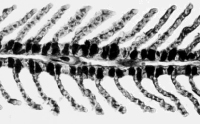


About the lab:
Physiological demands are especially important to anadromous fish because of their need to move between freshwater and seawater and to make long, often difficult, migrations. These demands can become critical when barriers to migration, and other changes in river ecosystems, occur.
The McCormick Laboratory is located 15 miles north of campus at the USGS Conte Anadromous Fish Research Center. We conduct research on physiological and endocrine changes that may limit fish populations, particularly those in need of conservation or restoration. We are particularly interested in how environmental change, both of 'natural' and 'human' origins, affects normal growth and development in anadromous fish. Physiological systems such as ion regulation, stress, energetics, growth and reproduction are critical for survival of migratory fish. Environmental factors such as climate change, salinity, temperature, stress, hatchery practices, dams and pollution may affect normal development of these complex systems. Because of threats to their survival in many rivers in the northeastern US, Atlantic salmon, American shad, blueback herring, alewife, brook trout, sturgeon and lamprey are the anadromous species of primary interest.

